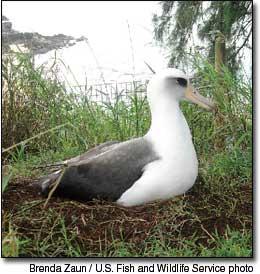Officials with the U.S. Fish and Wildlife Service have begun an inquiry into a report that at least eight Laysan albatrosses were killed by two dogs at Kepuhi Point in Kilauea last week. Brenda Zaun, a federal wildlife biologist with
Officials with the U.S. Fish and Wildlife Service have begun an inquiry into a report that at least eight Laysan albatrosses were killed by two dogs at Kepuhi Point in Kilauea last week.
Brenda Zaun, a federal wildlife biologist with the Kauai National Wildlife Refuge Complex, said she plans to contact Randy Rego of Waipake about the incident.
“Nobody contacted me about that (the reported bird killings). I need to call him,” Zaun said. “We need to get the birds.”
Rego said he, family and friends were picnicking on family property when they heard screams from birds, saw the dogs chase birds from a forested area, and chased the dogs away.
Some of the federally protected birds were tagged, indicating they were being used as part of ongoing efforts by the government to help perpetuate the species.
At least eight birds were reportedly stacked in a pile, dead.
The reported attack took place next to a two-acre site at Kakiu Point that was surrounded with fencing recently to protect colonies of albatrosses from attacks by predators, specifically dogs.
The fencing was put up after 14 albatrosses were found dead at the site on April 29. Based on injuries to the birds, federal investigators speculate dogs were involved in the attack.
In the latest attack, Rego said he and family members heard albatrosses “screaming” around 3 p.m. on that day.
“We have been there (Kepuhi Point) several times, and we thought it was not right, and we walked back to the forest and saw dogs chasing albatrosses out of the forest,” Rego told The Garden Island.
After a dog chased one of the birds to a grassy area along the coastline, Rego and others gave chase, yelled and scared the dog away, thus sparing the life of the bird.
“But we saw dogs attacking other birds in the forest,” Rego said. “The dogs were attacking the birds in their nests.”
At the same time, a caretaker from an adjoining parcel heard the yelling, and came to the point to see what was happening, Rego said. All of the commotion apparently scared the dogs away.
Rego said he and others took pictures and videotaped some of the birds, and saw some “were gasping their last breaths.”
After the caretaker stacked the dead birds, Rego said he, family and friends left the area, leaving the reporting of the incident to authorities to the caretaker.
Killing a bird, destroying a nest or taking an albatross egg can result in a $250 fine.
The site of the most recent albatross attack is located about a mile east of the Kilauea Point National Wildlife Refuge. About 100 albatross nests are found at the Kilauea refuge, which is part of a federal refuge complex that on Kaua‘i includes refuges in Hanalei and Lihu‘e. The complex is managed by the U.S. Fish and Wildlife Service. Another 60 albatross nesting sites are found on privately owned lands on the North Shore.
Lester Chang, staff writer, may be reached at 245-3681 (ext. 225) or lchang@pulitzer.net.


